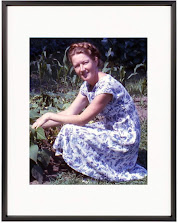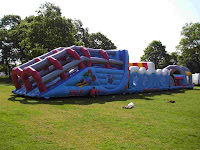Last week I met my first patient ever. She was an elderly woman with shortness of breath and swollen legs. McMaster's medical school is famous for getting their students to see patients within the first month of classes. But in reality, at this point we know next to nothing about medicine. So I and a classmate were assigned the fairly straightforward task of taking a medical history.
The patient was sitting upright in her hospital bed being pumped with oxygen and an IV drip. We proceeded to ask questions over the next half hour, trying to build up a complete picture of the patient's medical history. I felt very out of place, shuffling through my notes while trying to figure
out what to ask next. But the woman was patient and understanding. She also had a very dry sense of humour that made us laugh several times.
It was likely her heart had become too weak to keep pumping enough blood to sustain her body. The clinical term is “congestive
heart failure”. I felt sad, but the woman’s cheery mood and humour lifted
my spirits. At the end, my supervisor thanked her for taking
the time to speak with us.
“Oh yes, because I have a very busy schedule,” she
deadpanned, alluding to the fact that she was in her hospital bed almost 24 hours a day.
The only complication came early in the interview when the nurse changed the soiled diapers of a patient nearby. I have an extraordinarily sensitive nose and the smell hit me like a truck. Even if I was blindfolded in the morning, I could probably still sniff my way from class to class. This supersonic sense of smell can be a problem, since medicine is usually a smelly profession. But fortunately I got used to it quickly and it stopped bothering me. First test passed.
The only complication came early in the interview when the nurse changed the soiled diapers of a patient nearby. I have an extraordinarily sensitive nose and the smell hit me like a truck. Even if I was blindfolded in the morning, I could probably still sniff my way from class to class. This supersonic sense of smell can be a problem, since medicine is usually a smelly profession. But fortunately I got used to it quickly and it stopped bothering me. First test passed.
Although the clinical encounter was a high point, I feel like I've been rapidly burning out over the last two weeks. I’ve become overwhelmed with classes, extra-curricular commitments and
studying. 12 hour days are becoming common place, and even once I get home there are countless more readings to do.
Unfortunately this is very much self inflicted. I seem to have signed up for every extracurricular opportunity available - last week I registered myself for two medical conferences and a semester of hip hop classes. Facing a deluge of opportunities, it's too easy to say "Yes" to all of them.
| Best show ever |
Fortunately the turning point came a couple nights ago, when I was watching a National Geographic documentary on the human life cycle. The narrator was talking about menopause when my eyes suddenly welled up with tears. This came out of nowhere; I was actually in a good mood. I guess our bodies start to do unpredictable things when we push them too hard.
I dried my cheeks and reached for my sister's bottle of skin cream sitting on the desk. Smearing the cream over my face, I immediately grimaced - it was full of tiny, sharp particles. Exfoliator.
So here I was, exhausted and crying over a documentary about menopause while inadvertently exfoliating my face. I shut off the TV and went to bed.
Waking the next morning after a long rest, I felt determined to restore my sleep cycle and take better care of myself. Armed with this new determination, and with skin as smooth as a baby's bottom, I'll soon be ready to take on the world again.
So here I was, exhausted and crying over a documentary about menopause while inadvertently exfoliating my face. I shut off the TV and went to bed.
Waking the next morning after a long rest, I felt determined to restore my sleep cycle and take better care of myself. Armed with this new determination, and with skin as smooth as a baby's bottom, I'll soon be ready to take on the world again.










